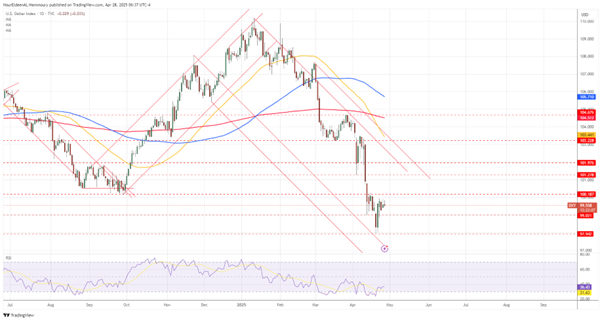Markets edge lower amid earnings focus, tariff tensions, and dollar dynamics

Global markets are navigating a complex landscape this week, balancing the weight of a crucial US earnings season, heightened tariff tensions with China, and shifting monetary policy expectations. As supply chain disruptions loom and inflation concerns rise, investors are also reassessing opportunities in US equities amid a weakening dollar backdrop. Meanwhile, Europe’s economic prospects show signs of divergence, with the European Central Bank (ECB) contemplating a possible pivot in its rate trajectory.
Below is a detailed breakdown of the latest developments across markets, trade, and policy:
Sluggish futures ahead of key earnings

US equity futures posted modest declines as markets prepared for an intensive wave of corporate earnings, with S&P 500 companies representing nearly $20 trillion in market capitalization set to report.
- S&P 500 futures fell 0.1%.
- Nasdaq 100 futures declined 0.1%.
- Dow Jones Industrial Average futures were little changed.
A four-day rally in US equities has momentarily paused, as investors await results from major tech giants, including Microsoft, Apple, Meta Platforms, and Amazon. Earnings growth for the so-called Magnificent Seven is expected to remain resilient, projected at an average 15% for 2025.
Meanwhile, volatility around President Trump’s tariff moves has calmed slightly, but trade negotiations remain a critical factor. Trump has hinted at little flexibility regarding further delays in implementing higher tariffs, keeping Asian economies — and markets — on edge.
Supply shock risks: Tariffs threaten US economy
The escalation of tariffs to 145% on Chinese imports is starting to reverberate through global supply chains.
- Cargo shipments from China to the US have reportedly fallen by as much as 60%.
- Major retailers such as Walmart and Target warned of potential product shortages and price hikes as early as mid-May.
- Freight capacity cuts could lead to bottlenecks and shipping congestion even if a trade truce is reached later.
The impact could mirror COVID-era shortages, but with more prolonged consequences. Retailers are scrambling to diversify suppliers, leaning increasingly on Southeast Asia to fill the gap left by Chinese goods.
Economic forecasts are now factoring in a notable slowdown in imports, raising inflationary risks and prompting some analysts to warn of recession odds approaching a 50-50 chance.
Dollar weakness: A silver lining for US stocks

Despite the clouds of trade tension, the weakening dollar offers a supportive backdrop for US equities.
A softer dollar is seen as cushioning US corporate earnings, especially for multinationals with significant overseas revenue.
- S&P 500 is expected to remain within the 5,000–5,500 range in the near term, contingent on trade developments and earnings momentum.
- The relative quality of US large-cap companies, combined with late-cycle economic dynamics, may continue to favor American stocks over international peers.
However, risks persist. Continued tariff uncertainty and slowing economic momentum could temper upside potential, leading some investors to rotate toward international equities.
Potential ECB rate hike in sight

In contrast to the Federal Reserve’s anticipated easing bias, the European Central Bank could start contemplating interest rate hikes by late 2025.
- Rising defense and infrastructure spending across Europe, particularly in Germany, is expected to bolster growth.
- ECB’s deposit rate is projected to bottom between 1.5% and 1.75% before a potential upward pivot.

The shift toward fiscal stimulus through defense budgets may steepen European bond yield curves, particularly penalizing countries with weaker fiscal positions such as France and Italy.
Commodities, bonds, and currencies snapshot
- Gold: Fell 1.2% to $3,278.89/oz as traders locked in profits after a strong rally.
- 10-Year US Treasury Yield: Rose by 3 basis points to 4.26%.
- Dollar Index: Little changed after an early retreat.
- Oil (WTI): Fell 0.4% to $62.78/barrel.
This week stands as a critical test for financial markets, with a confluence of factors demanding investor attention:
- Corporate earnings amid tariff disruptions
- The trajectory of US-China trade tensions
- The impact of a weakening dollar
- Potential shifts in global monetary policy
Markets remain delicately balanced between optimism over resilient earnings and caution over structural supply shocks and policy uncertainty.
Investors should brace for potential volatility as macroeconomic data, corporate results, and geopolitical developments unfold over the coming days.
Prepared by Nour Hammoury, Chief Market Analyst at SquaredFinancial
Nour is an investor, independent market strategist, and financial advisor. He holds a BA in Finance and Banking Science from Al-Ahliyya Amman University and a CFTe in Economics from the International Federation of Technical Analysts. He has more than 15 years of experience in forex, stocks, and global economic developments, as well as central bank policies and intermarket analysis. He appears regularly on major international TV networks, such as BBC, Al-Jazeera, Al Hurra, CNBC, and Bloomberg, holding open discussions and sharing insights and readings of the markets and trends.
Disclaimer
This is a marketing communication and does not contain, and should not be construed as containing, investment advice or an investment recommendation or, an offer of or solicitation for any transactions in financial instruments. Past performance is not a guarantee of or prediction of future performance. The information contained herein does not constitute a personal recommendation and does not consider your personal investment objectives, investment strategies, financial situation or needs. Squared Financial makes no representation and assumes no liability as to the accuracy or completeness of the information provided, or any loss arising from any investment based on a recommendation, forecast, or other information supplied by Squared Financial.
The information on this site is not intended for any person in any country or jurisdiction where such distribution or use would be contrary to local law or regulation.